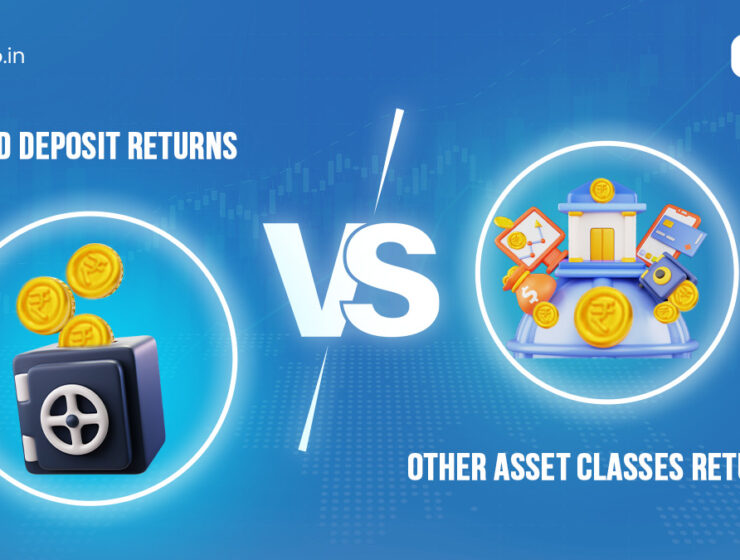

Over the years we have been instilled with the notion that REIT investing is the most ideal form of investment if a comparison was to be made with the other alternatives. Evidently, it is hard to argue with this as land is not available to us in abundance which naturally causes a perpetual increase in its fair value.
Even though the most basic human requirements stand to be food, clothing, and shelter, we cannot dismiss the fact that housing is a costly affair. And to be able to further invest in real estate is a dream attached with plenty of hurdles.
Here’s where REIT (Real Estate Investment Trust) can be your light at the end of the tunnel. Let us dissect this concept and go through it step by step.
What is a Real Estate Investment Trust?
REIT investing was introduced to the Indian market in April 2019. It is an investment scheme that functions in a similar fashion as stocks allowing investors to pool their money into an investment portfolio. Traditionally, investments are made for equity but in this case, the asset whether direct or indirect will be real estate.
For instance hotels, malls, offices, healthcare facilities, etc. that are leased or rented will be the object that you invest in. With this, you won’t be burdened with the cost of actual property purchase yet, at the same time be able to encash incredible returns.
The basic structure of a REIT investing consists of a sponsor, a manager, and a trustee who regulates the investments by managing properties. Typically when income is generated from real estate, it is distributed as a dividend among all the shareholders. A REIT can directly own its holdings or do the same through an SPV (Special Purpose Vehicle) or a holding company.
Special Purpose Vehicle (SPV):
An SPV is a company that holds at least 80% of the stake directly in the real estate assets and is not allowed to invest in any other SPVs. Either the holding company or the REIT holds at least 50% of stakes in an SPV.
Holding company (Holdco):
It is a company or a limited liability partnership in which the REIT has at least 50% holding. The Holdco then further invests the same in an SPV. The ultimate holding in a real estate property lies with an SPV.
How does the REIT work?
As previously stated, REIT investing is made up of a 3 layered structure.
A sponsor:
Whoever forms the REIT is called the sponsor. Usually, it is a builder or a real estate company. The sponsor has to hold a 25% stake for the first 3 years which can later be decreased to 15% of the total REIT units.
A trustee:
A trustee holds the assets on behalf of the investors and ensures that the dividends are paid on time. A trustee is appointed by the sponsor and works in the interest of the unitholders.
A manager:
The manager is appointed by the trustee who then takes the responsibility of making all the investment-related decisions. Commonly, a private company acts as a manager for the REIT.
What are the different types of REITs?

REIT investing is a vast concept. But you need not be confused. We will narrow it down for you and go through every type of REIT to help you make a suitable choice.
Equity REITs:
This is the most popular and generic form of REIT investment option. It is simple to understand as it mainly controls and manages commercial properties and generates income through rent.
Mortgage REITs:
As the name implies, this scheme lends money through mortgages and loans to real estate owners. Needless to say, they earn income from the interest received on these mortgages. When interest rates are high, mortgage REIT investors tend to benefit more than equity REIT investors.
Hybrid REITs:
This allows investors to dually invest in equity and mortgage REITs. It allows investors to gain income from both rent and interest. Hybrid REIT gives you an investment edge by being diverse in itself.
Private REITs:
These are neither registered with SEBI nor traded on National Securities Exchange. It is privately sold only to a few selected investors which does not make it an accessible option to the investors at large.
Note: Private REITs are not available for Indian investors yet.
Publicly traded REITs:
These are the opposite of private REITs. Publicly traded REITs are regulated by SEBI and are traded on National Securities Exchange. Investors can buy and sell their shares just like regular equity shareholders.
Public non-traded REITs:
These REITs are registered with SEBI but cannot be traded on National Securities Exchange. Hence, public non-traded REITs are not affected by any market fluctuations which makes them relatively stable.
What rules are the REITs subjected to?
The REIT is regulated by the SEBI. Any company that wants to qualify as a REIT must comply with the regulations of the Indian Trust Act, 1882. Here are some of the most important rules that the REIT has to cater to.
- REITs have to pay 90% of their taxable profits to the shareholders in the form of dividends. As a result, they are exempt from paying tax on these returns. But, the burden of the same will be shifted onto the shareholders and they will be taxed on the dividend they receive
- A minimum of 80% investments made by a REIT need to be in commercial properties that guarantee revenues. A maximum of 20% can be invested in under-construction properties, stocks, bonds, etc.
- Net Asset Value (NAV) has to be updated twice in each financial year
- A REIT needs to have an asset base of at least Rs. 500 crores.
- Minimum 100 shareholders are required
- At least 95% of REITs income should be invested\
- 50% of the shares should not be held by five or less than five individuals during each taxable year
- Has to be mandatorily registered on the stock market
What are the key differences between REITs and Real estate mutual funds?
- Real estate mutual funds invest in the shares of a real estate company while REITs invest directly in the property
- You will reap regular returns from a REIT but a real estate fund will give you higher returns
- REITs are comparatively more liquid and flexible than real estate funds.
- Real estate funds replicate traditional mutual funds whereas REITs follow a similar pattern as stocks and exchange-traded funds.
Is investing in REITs really worth it?
REITs have already proved to be a boon for small investors who find it beyond their capacity to otherwise invest in real estate. Nonetheless, it is a new concept for India and it will most likely undergo many more changes in the coming years
Substantially, REITs provide a regular and steady dividend. It is a good substitute for a long-term investment in real estate. It also allows diversifying your investment horizons. Although REITs are not equipped with tax-saving benefits like the ones available on home loans, they still yield a sufficient amount of returns on a lower investment input.
Indisputably, REIT is an interesting initiative but it may not appeal to everyone. Being a single branch out of the many other investment opportunities, it leaves the choice up to you. Make sure to have a broader investment portfolio and select the course of financial planning that best floats your boat.
A financial planning platform where you can plan all your goals, cash flows, expenses management, etc., which provides you advisory on the go. Unbiased and with uttermost data security, create your Financial Planning at Rs. 1499/-
Disclaimer: The views shared in blogs are based on personal opinions and do not endorse the company’s views. Investment is a subject matter of solicitation and one should consult a Financial Adviser before making any investment using the app. Making an investment using the app is the sole decision of the investor and the company or any of its communication cannot be held responsible for it.
Related Posts
Stay up-to-date with the latest information.


